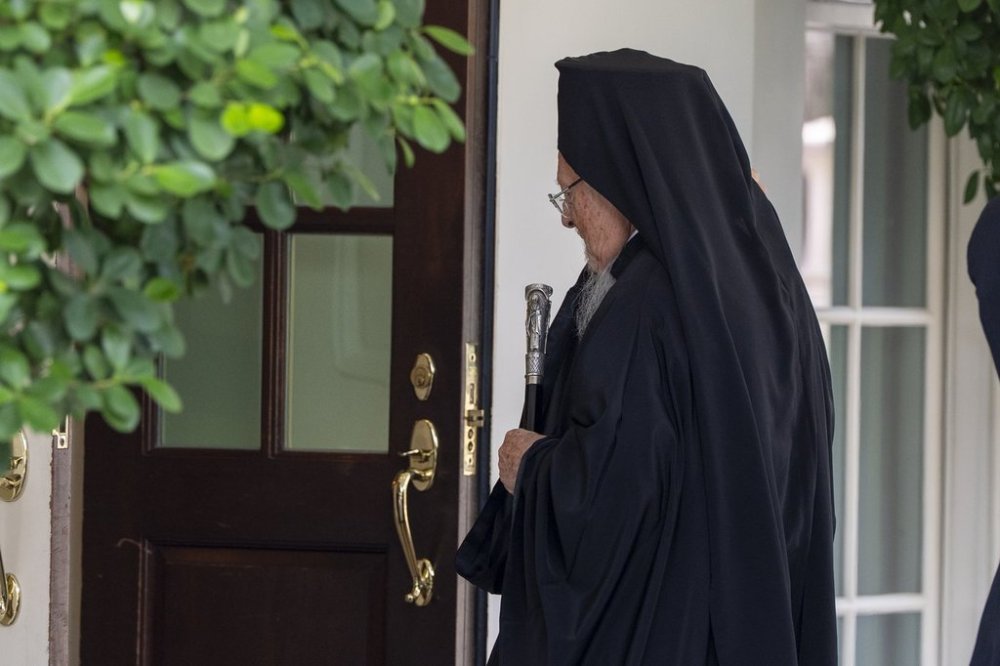Orthodox patriarch defends recognition of an independent Ukrainian church
Advertisement
Read this article for free:
or
Already have an account? Log in here »
To continue reading, please subscribe:
Monthly Digital Subscription
$1 per week for 24 weeks*
- Enjoy unlimited reading on winnipegfreepress.com
- Read the E-Edition, our digital replica newspaper
- Access News Break, our award-winning app
- Play interactive puzzles
*Billed as $4.00 plus GST every four weeks. After 24 weeks, price increases to the regular rate of $19.00 plus GST every four weeks. Offer available to new and qualified returning subscribers only. Cancel any time.
Monthly Digital Subscription
$4.75/week*
- Enjoy unlimited reading on winnipegfreepress.com
- Read the E-Edition, our digital replica newspaper
- Access News Break, our award-winning app
- Play interactive puzzles
*Billed as $19 plus GST every four weeks. Cancel any time.
To continue reading, please subscribe:
Add Winnipeg Free Press access to your Brandon Sun subscription for only
$1 for the first 4 weeks*
*$1 will be added to your next bill. After your 4 weeks access is complete your rate will increase by $0.00 a X percent off the regular rate.
Read unlimited articles for free today:
or
Already have an account? Log in here »
The spiritual leader of Eastern Orthodox Christians, speaking Friday before a New York audience, defended his 2019 decision to recognize an independent church in Ukraine, and he denounced the Russian Orthodox Church as giving a “ringing endorsement to the invasion of Ukraine.”
Ecumenical Patriarch Bartholomew of Constantinople made the remarks before the Council on Foreign Relations during a stop on his 12-day visit to the United States. It also included meetings with President Donald Trump and other political leaders.
Bartholomew has long been critical of the Russian Orthodox Church and its support for the full-scale Russian invasion of Ukraine in 2022.

He reiterated those criticisms on Friday, saying the Russian church had endorsed the “murder of fellow Orthodox Christians by the Putin regime.” Russia and Ukraine are both majority-Orthodox countries.
Even before the invasion, the Russian Orthodox Church had declared in 2018 that a break in communion existed between it and Constantinople. That came as Bartholomew prepared to recognize the Orthodox Church of Ukraine as independent the following year. The Moscow church claims that Ukraine is part of its church territory, but Bartholomew claimed jurisdiction to recognize an independent church.
On Friday, Bartholomew said that the Moscow church has gone against Orthodox teaching in promoting a “Russian world” ideology that deems Russia a spiritual protector of a wider territory, including Ukraine.
Moscow Patriarch Kirill has defended the war, saying Russia’s war dead have their sins forgiven and presiding over a council that called the invasion a “holy war” against a Western world it considers “fallen into Satanism.”
Ukrainians are “no longer subject to a church that has compromised itself,” Bartholomew said. “They have the freedom of conscience they desired.”
But the Russian church only recognizes the legitimacy of the Ukrainian Orthodox Church, which is historically under the Moscow church’s authority. It has attempted to distance itself from Moscow because of the latter’s support of the invasion, but Ukrainian authorities aren’t convinced it has made a clean break and are seeking to ban it.
Bartholomew’s wide-ranging speech Friday also called for the international community to work to bring peace to the ongoing Israel-Hamas war and related conflicts, and he decried the rise of online extremism and political violence. He applauded the United States’ constitutional system of checks and balances but urged against excluding faith from the public square, citing George Washington’s quote that “religion and morality are indispensable” to good government.
Bartholomew is considered first among equals among Orthodox patriarchs, but he lacks the power of a Catholic pope. Each Orthodox jurisdiction, organized largely along national lines, governs itself while sharing such things as creeds and sacraments.
Bartholomew is based in the ancient Byzantine capital now known as Istanbul, and he leads a small Orthodox flock in mostly Muslim Turkey. He also oversees jurisdictions abroad, notably the Greek Orthodox Archdiocese of America.
In contrast, Kirill oversees by far the largest Eastern Orthodox jurisdiction in the world, with about 100 million people in Russia alone, according to a 2017 global survey by the Pew Research Center. The Moscow church also claims jurisdiction over some churches in other countries, including the United States.
Kirill and Russian political leaders have justified the invasion in part by claiming Ukraine to be part of the “Russian world” and citing historical grievances of the church against alleged Western encroachment. Russian President Vladimir Putin has been accused of war crimes by the International Criminal Court.
Bartholomew is scheduled to receive the prestigious Templeton Prize on Sept. 24 in New York in honor of his outspoken work on behalf of the global environment.
___
Associated Press religion coverage receives support through the AP’s collaboration with The Conversation US, with funding from Lilly Endowment Inc. The AP is solely responsible for this content.
The Free Press acknowledges the financial support it receives from members of the city’s faith community, which makes our coverage of religion possible.


